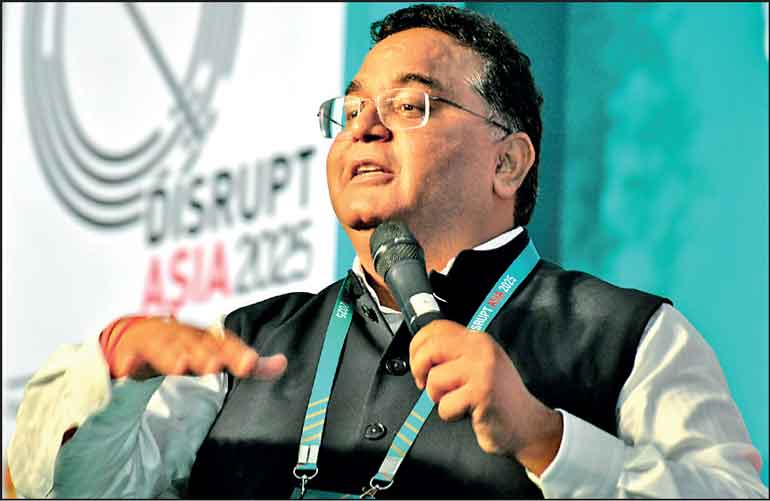Tuesday Feb 24, 2026
Tuesday Feb 24, 2026
Friday, 19 September 2025 00:00 - - {{hitsCtrl.values.hits}}

Paytm Founder and CEO Vijay Shekhar Sharma
– Pic by Lasantha Kumara
By Charumini de Silva
India’s fintech giant, Paytm Founder and CEO Vijay Shekhar Sharma yesterday urged Sri Lanka to seize its moment to transform into a global digital economy hub.
Delivering an energetic and impassioned keynote at Disrupt Asia 2025, he drew parallels to India’s own journey and highlighted connectivity, digital payments, credit expansion, and local ambition as the pillars for sustainable growth.
Sharma compared Sri Lanka’s status today to India 10-15 years ago, noting that political leadership, particularly President Anura Kumara Disanayake’s commitment to a digital economy, could be a turning point.
“The President has taken the role of Digital Economy Minister. He wants to make sure that Sri Lanka in his tenure becomes a digital economy and leaves a lasting legacy on Sri Lanka. I was inspired. Here is a man who wants to move every mountain to get there. That is the potential and opportunity we are talking about,” Sharma said.
He predicted that with the right ambition and execution, Sri Lanka could undergo a dramatic transformation. “I can confirm, in 10 years’ time, this country will look so different, because I see the commitment deliver results,” he said.
With a call for confidence and unity, he said Sri Lanka has the leadership, talent, infrastructure, and opportunity to rise as a global player. “Don’t just become a great Sri Lankan economy, become a world economy,” he asserted.
Parsing the country’s digital infrastructure, he cited a test speed of 140Mbps in a public space as “incredible connectivity” and a key enabler of future growth.
Sharma warned that digital adoption will remain limited unless users trust that digital money is equal to physical cash. “If $ 100 becomes $ 99 and arrives two days later, why would people switch to digital?” he asked, pointing out India’s success with the 0% Merchant Discount Rate (MDR) policy, which spurred adoption.
He said a free model can still make money by using Paytm’s own model as an example. He explained how free services can be monetised through premium add-ons. “If you have a paper QR, you don’t pay me anything, but if you have a sound box, you pay Rs. 100 a month. Each month, 15 million merchants pay us, creating hundreds of millions of dollars in revenue annually,” he noted.
While India and other partners can contribute technology and investment, Sharma insisted Sri Lanka must lead its own transformation. “Sri Lanka’s problems cannot be solved by outsiders. They will be solved only by Sri Lankans. Therefore, local will and ambition must stop the country’s economy from stagnating,” he stressed.
He also pointed to the country’s geographic position, tourism potential, agriculture, and connectivity as untapped advantages. “You are sitting in the centre of the world. The world needs Artificial Intelligence (AI) datacentres, energy, and connectivity. The amount of investment the economy can attract is huge. You just have to decide to do it,” he said.
Sharma said that investors will flock once Sri Lanka builds credibility and momentum. “When you chase money, money runs away. But when you build value, money comes to chase you. We, as India, will put our dollars where our mouth is—in Sri Lanka,” he pledged.
He encouraged Sri Lanka to leverage its natural beauty and agricultural strengths. “Dubai built itself from the desert. You have effortless beauty; golden sands, organic agriculture, heritage, and spiritual tourism. Why not sell that story to the world and capitalise on it?” he asked.